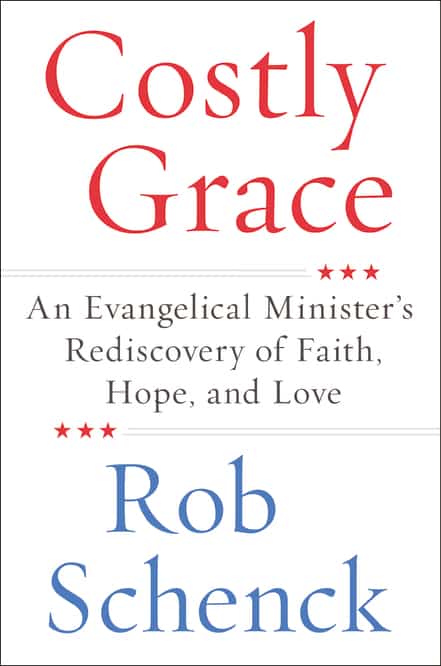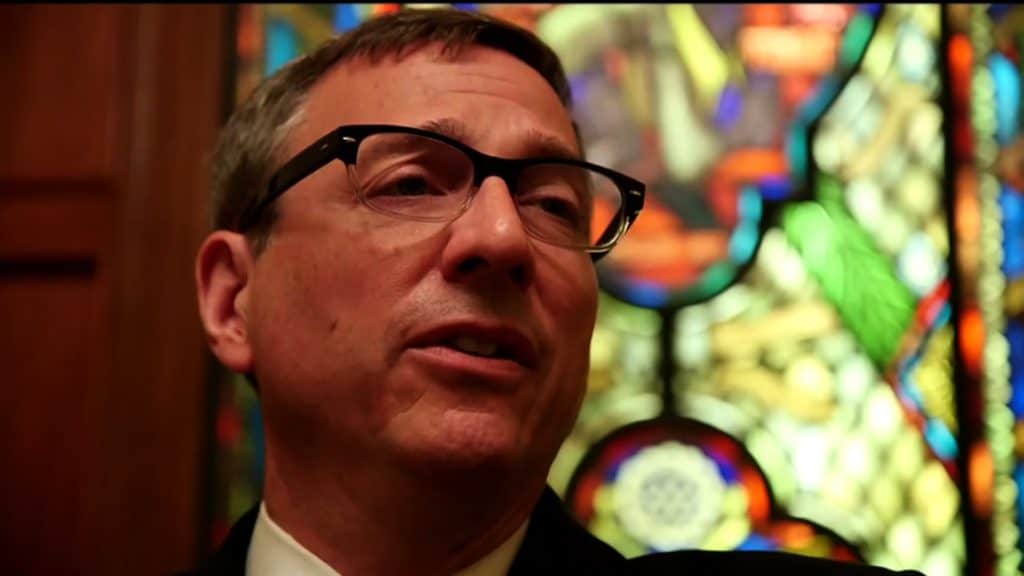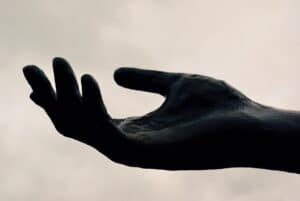
An interview with Rev. Rob Schenck
“One of my favorite moments in the Gospels is when Jesus told his disciples what would be the hallmark of a Christian: ‘By this shall all people know that you are my disciples, if you have love for one another.’ I long to return to that courageous kindness, to a spiritual simplicity based on that divine common denominator of love.
“I can say three things about my spiritual journey: I was born again and professed Jesus Christ as my Lord and Savior. It was the beginning of something new, something helpful, something beyond the limitations of our humanity. It led to a path filled with light, with love, and with hope. But then I listened to a beguiling voice–mixed with others, of course, but it was not the voice of my Lord. This voice was determined not to lead souls to a savior but to capture them for a self-serving end. I was seduced by that voice, and it led me into that dark wood. I did some good in that place, but it was contaminated by ambition, hubris, and disregard for the other, a stranger. … I was blinded to the real work of caring for souls. To engage in the scrum of the debate, score a win, maneuver for domination, exercise influence, and leave it there, or worse, cloak it as gospel, is to do no good at all, but instead, to inflict great harm.”
~ Rob Schenck in Costly Grace
In his new memoir, Costly Grace: An Evangelical Minister’s Rediscovery of Faith, Hope, and Love (just out from Harper), Rev. Rob Schenck writes a tell-all from inside the Beltway, exposing the American church’s obsession with political power that explains how 81 percent of white evangelicals could vote for a man whose persona and lifestyle are anathema to their faith. But Schenck tells mostly on himself, and therein lies the treasure of this book. It is Schenck’s unflinching analysis of his self-righteous appropriation of political power and the humble gratitude of his conversion back to Jesus that make Costly Grace what I hope will prove a loving corrective to the church. This book is a gift—a painful one, granted, but if embraced it will begin to relieve the white American evangelical church of the excruciating log that is firmly lodged in its own eye.
An anti-abortion crusader who used the media shrewdly and effectively, a pastor who (through his organization Faith & Action) advised the DC elite and considered the GOP God’s own party, Schenck beat the dual drums of pro-life and anti-gay rhetoric in caustic, unnuanced ways that played on some of white America’s deepest fears. But when a filmmaker approached him about doing a documentary (The Armor of Light) centered on the question “How can one be pro-life, yet also pro-gun?” Schenck began asking himself a series of questions that eventually led him back to his first love—and reminded him that God belongs to no party and that all humans—yes, even LGBTQ, undocumented, and Muslim humans—are precious in God’s sight.
Schenck ended up immersing himself in the work and life of Dietrich Bonhoeffer, the German pastor and Nazi resister who confronted a politicized gospel in World War II-era Germany. Inspired by Bonhoeffer’s life and disturbed by the similarities between the German Evangelical Church and the nationalistic faith community for which Schenck himself had long been a spokesperson, Schenck found his heart changed in a number of surprising ways, collaborated with people he never could have imagined working with let alone befriending, and experienced a life-changing liberation of his faith that has shaken the foundations of almost everything he was accustomed to standing on—and for. Today, through the work of The Dietrich Bonhoeffer Institute, his mission is to help Washington conservatives abandon the divisive politics of fear and violence and instead approach “society’s greatest cultural issues and perplexities” with nuance, biblically grounded conflict resolution, and “rigorous ethical reflection.”
I was delighted to speak with Rev. Schenck the week before his book was released. Our conversation follows.
You write in your book that at one time you hired a marketing firm that used a fundraising approach that they actually called Fear & Anger. That approach seemed to work quite well when used to get people’s ire up in order to raise funds to protect unborn children from death by abortion—why do you think it doesn’t work when trying to protect school children from death by assault weapons? There is so much to be afraid and angry about with all these mass shootings. Do you have any sense of what’s missing here?
Rev. Rob Schenck: That’s a very good question that probably demands professional investigation and considered research, but my impression is that there is an even greater fear at work among evangelicals when compared to, for example, the safety and security of children. This even greater fear is a self-focused fear—fear of persecution, fear of a tyrannical government, which seems ironic in our times, because the Republican party is now in total control, and yet this anxiety still exists—that if guns are taken away we will have no means of fending off persecution. That becomes a greater concern than even the children. There is a human survival instinct that has gone awry in this equation. There’s a complicated hierarchy here of fears, and the premier fear seems to be for self-preservation. I think it’s erroneous, it’s errant, but it exists.
And then, the Second Amendment has really become a cardinal doctrine—more than a principle, it’s become a cardinal doctrine within a large sector of the conservative Christian world, so, in a way, any challenge to unfettered gun rights, or at least that interpretation of the Second Amendment, becomes a form of heresy for that politicized sector of evangelicalism. You’re actually challenging doctrine. And this is where I think the doctrinal error comes in. This is a theological matter as much as a political and sociological one.
You did your dissertation for your DMin in Church and State on the Deutsche Evangelische Kirche, The German Evangelical Church, in the 1930s and ’40s. Attracted by Dietrich Bonhoeffer’s faith and Nazi resistance, you found some striking similarities between the church in that place/time and what we’re seeing in the American evangelical church today. What are the most notable similarities between the German church at that time and the American church today?

Schenck: One would be the devotion to what the German Christians called blood and soil, which was patriotism and ethnocentrism. They were focused on country and race. The parallel for us in American evangelicalism today is this eclipse of our devotion to Christ as Lord and Savior and to his church, which is universal—it has no geopolitical boundaries to it—this is a very close parallel. For example, it used to be we would say “God and country.” Now, in many ways, it’s become “country and God.” Our patriotism defines our theology and our ecclesiology, rather than the other way around. There’s certainly nothing wrong with a warm embrace of your country and your fellow citizens. That’s probably very healthy in most instances. But when that becomes a form of devotion that eclipses your devotion to God and God’s universal family, now we have a serious crisis, which is how it started in Germany.
A lot of people imagine that Adolph Hitler came right out of the gate as a tyrannical autocrat who immediately implemented the final solution for Jews and others. That’s not what happened. There was first a kind of enthusiastic patriotic nativism that occurred, and the church embraced that. And then, for example, they started draping altars with the flag of the party, which was the swastika. There are times when, in an American church sanctuary, the American flag eclipses the cross. When the most prominent thing becomes the American flag, that suggests a mislocation of devotion, of ultimate and absolute devotion. And that occurred in Germany before anything else happened.
When talking with Christians, what do you suggest to deal with the gun situation in this country?
Schenck: First of all, I think it requires a lot of spiritual introspection, to ask ourselves why we embrace these popular notions about guns and self-protection. What is it we fear? What does the weapon do for us? This is where I’ve introduced the question of idolatry, because it’s a problem if we’re looking to the gun to save us from whatever we fear. Including our security in the pew—more and more churches now are turning toward armed defense. Certainly there is nothing wrong with leadership of the church being concerned about the physical security of the congregation. That’s right and good and natural. But when you turn to lethal force you introduce all kinds of moral and ethical and even spiritual and perhaps doctrinal questions into the equation. Because now you have to ask: When is a Christian permitted to take human life violently? Whose life is worth more in comparison to the other? What role does martyrdom play in any of this?
These are very big spiritual questions. And they have to be addressed. There is no simple two-dimensional answer to that. And, of course, I believe strongly in the sanctity of human life, and most churches that I keep company with would say the same, so then we have to ask: How do you respect the sanctity of human life when you assign a group of people or a budget or a series of decisions and a sector of the church that is now charged with killing? Because if you’re going to protect people with a lethal weapon, you must be ready to use that weapon. Otherwise you are actually presenting a greater danger to the church, so now you’re actually assigning people to kill. And what is the role of the shepherd of souls in that, the pastor, guiding those people to kill? The leadership of the church sanctioning that killing? The house of God quartering that killing? And then what happens when the person is innocent, as was the case with the church in Pennsylvania where a couple years ago a visitor to the church who had come to find spiritual succor and relief from mental and emotional distress got into a tense situation with an usher and with a member over the seating, and a member of the church who was armed approached. It escalated; he shot and killed the visitor in the sanctuary while the worship service was underway. And it turned out the visitor was unarmed—and simply emotionally distressed.
Well, an innocent man was murdered in the sanctuary. How does that upset the overall life of the church? The time to address these questions is not after such an incident, when terrible damage has been done to everyone involved, including the witness of the church in the community and in the world. Those questions have to be asked beforehand. So I’ve been encouraging pastors to think that scenario all the way through—it’s no longer theoretical, it’s actually happened to a church. Let’s ask the question: What will happen to us when this occurs in our church? It was a Southern Baptist Church and frankly the kind of church I would be attracted to. It was just a lovely community evangelical church and this occurred and they have never recovered and will never recover.
If you could sit down with Bonhoeffer today, what would you ask him?
Schenck: Wow. Oh my. I would certainly ask him, “How can we, in this time and place, avoid repeating what occurred in your day in Germany? Is it possible to avoid it, and if so, what is the path that we must take? What is the most important thing we must be conscious of in order to avoid the catastrophe that occurred in the church in Germany?” That would be my most important question for him.
I was blessed because I did my study tour, on the life of Bonhoeffer, through Europe in 2010, and I was there just in time to talk with Franz Von Hammerstein, who was then 89 years old. He was the last living person to have spoken to Bonhoeffer before he was executed. Von Hammerstein was a teenager when he was arrested by the Gestapo, because he was a catechism student of Martin Niemöller, the other famous dissenting pastor in Berlin, and he was swept up in the arrest by mistake and ended up, at the age of 17, on the same Gestapo transport vehicle with Bonhoeffer. I asked Hammerstein if it seemed to him that Bonhoeffer was preparing himself for martyrdom. And he said to me, “Oh no, not at all. He spoke only about rebuilding the witness and integrity of the church after the war was over. Everyone knew at that point that Germany would lose—the Russians and the allies were already inside the country—and Bonhoeffer was going to give himself to rebuilding the church, and he challenged me, this young man, to take up that cause.”
So, in many ways, I think about Bonhoeffer as unfinished work. He was never able to do what he really wanted to give his life to after the war was over, and I think that’s the challenge of our time now—to do for the church in the United States, and maybe in the West in general, what Bonhoeffer hoped to do for the church in Germany after the war ended, but of course he was executed before it came to its conclusion.
But he was planning an assassination at the time of his arrest…it’s very complex, right? To die a martyr, but a martyr who was planning on assassinating a head of state?
Schenck: Yes, he was part of the conspiracy to assassinate Hitler, and he hoped that that would end the war, and that then they would rebuild the integrity of the church. That really deserves some attention in itself. It’s one of the reasons I am able to introduce Bonhoeffer into the equation, because for evangelicals that makes him a hero. You know, he was planning to assassinate Hitler, so the guy’s got some street cred—even though Bonhoeffer eschewed violence in general and, you could argue, was even a pacifist. When people have said to me, “Well, Bonhoeffer was part of a conspiracy to assassinate—doesn’t that legitimate our use of force and lethality?” And my answer is: “Are we in a cataclysmic world war? Are 6 million people being systematically murdered in camps around us?” I mean, that was Bonhoeffer’s argument—that nothing is normal here—and we have to ask the same questions in our own context.
Which of your theological shifts surprises you the most?
Schenck: I think the LGBTQ dimension. Only because I didn’t think I would find myself traveling that far on this journey. I thought it would be confined to the more obvious and “safer” issues, even though I ran a very high risk on the gun question, and even though I knew the race question, for example, would wrinkle more than a few people, who think I was playing to some left-wing script, which is often what I am accused of now. But I didn’t plan to investigate the LGBTQ question. It was not on my list. But I had to get there, because once I treated the gun question, once I treated the race question, now it was all about humanity and the human family and human dignity and human identity and the image of God in humanity and how God has fashioned humankind. And when you go there you have to go to human sexuality. It is at the very core of our existence. There is no greater drive, I would argue, than the sexual drive in us—for many reasons—for intimacy, for procreation—all of those things are implicated in our sexual identity, our core concepts of ourselves. All of our relationships are affected in one way or another by our sexuality, and I couldn’t stop. It would have been artificial to stop, so I had to travel there.
Was that mostly a theological and study-based shift, or were there relationships in there that were transformational for you?
Schenck: It started relationally, with people I was encountering. One in particular that looms very large was Jim Obergefell, who was at the focus of the Obergefell marriage decision at the Supreme Court. I sat next to him—I’d like to say by chance, but I’m still a very strong believer in Providence! And, providentially, I happened to be seated next to him at the Supreme Court during the argument of his case. It was stunning. And when we introduced ourselves to each other and he said, “I’m Jim Obergefell,” I said, “Mr. Obergefell? Of the case we’re listening to?” He said, “Yes.” And that encounter was so profound. It was like—I don’t know—maybe how it was for Jesus to encounter the woman at the well? It was just a profound human encounter for me. And that was on top of several others before him. And then just listening deeply and suspending my judgment opened my heart and my mind, and I started to see Jesus’ encounters with the unlikely others and the profound exchanges that occurred there—how scandalous it was for him to speak to that woman at the well and why he affirmed her and accepted her completely, and then that got into our whole concept in evangelicalism, the quintessence of which would be a Billy Graham Crusade where we all sing “Just as I Am.” And yet so often we don’t accept people just as they are. We say, “Oh no, you have to meet certain criteria in order for me to accept you, to love you, to affirm you.” So we contradict the very gospel that we claim to espouse. And that became a problem for me. And then it went deeper, and I read the work of theologian and moral philosopher David Gushee, his book Changing Our Mind, which treats this question theologically, and that helped me process it, so it went from relational to theological. And I’ve still got so much to learn. I’m on my own journey of change and trying to reconcile all this with doctrinal and theological impulses.
I’d love to hear you talk about the cost of your new posture of humility and your return to the gospel of Christ. I’m sure there have been personal, professional, and political implications—both costs and rewards. What stands out?
Schenck: The greatest consequence has been the strain on my friendships, because friendships mean a lot to me. Most of my friends are friends of 20, 30, even 40 years. I keep friendships for long periods of time, and I value that very highly. And this has strained many of those friendships and has even ended a few of them, and that is extremely painful for me. So that’s been the greatest cost in all of this.
But there have been others. We had an immediate 20 percent downturn in revenues for our organization, Faith & Action, which can be fatal to an organization our size. We had a few angels that came out and rescued us, but that doesn’t repeat itself—that’s the one-off event. So, as a consequence, I’ve had to essentially say goodbye to the organization I spent 32 years building, and that’s being consummated even as we speak. I’m losing what I spent 30 years of my life building. So that’s pretty tough. I’m leaving it voluntarily, because I don’t want any further injury to the organization or to the future or to the intentions of the donors who have given so much for it. So that will survive, but without me. I have to leave it. And that’s very painful. So those are two very high prices I’ve had to pay.
The reward, though, has been, first of all, how expansive my world has become. I’ve discovered whole universes of Christians I didn’t even know existed. Wonderful, loving, generous, kind people. We all have our problems—I mean, everybody has them—we’re humans. But on the whole I have discovered this very loving and very generous world, and that’s been a great reward. But the biggest reward has been the reunion I’ve had with my own family through this whole process, how much it has strengthened my bond with my wife, Cheryl, with my children, and that has been the biggest reward for me.
What is giving you hope these days?
Schenck: Young people. My old community tends to be very critical of millennials, for example, very harsh, calling them snowflakes, pampered, spoiled brats, overly indulged, unmotivated. That’s not how I see them. I see them as very concerned about the world they habit, its future, the moral integrity of the people of God. They tend to think of the church differently than we do—not so institutional, but let’s call it the community of Christians, the witness of God‘s people in the world. They tend to be very concerned about people’s temporal needs, that they’re properly cared for. So, to me, they offer tremendous hope for the future, and I look at the old guard of evangelicals and think their days are numbered. This new generation, this new wave of young people are now assuming their place in the church, and that’s very hopeful sign to me. The other is that I’m starting to see that the questions I’ve raised over the last five or six years are gaining traction. I just saw an editorial by Mark Galli in Christianity Today called “God Hates Gun Violence,” and he makes a wonderful theological defense of that assertion. Wow. I thought we were 10 years from that editorial, but we have it now. And that is very hopeful to me.
And, of course, Christ is really the solution—and now I start sounding like an old-timey preacher, because the answer is revival! But if you look at the work that, for example, William Barber is doing in the Moral Monday movement, that is revival! That is renewal—the spiritual, moral, ethical, social revivification of the best of what’s good and what’s Christ-centered and Christ-modeled. I look at that and say, This really can happen. But just as real is the possibility of disaster. We would be foolish to dismiss the possibility that it could go to the opposite extreme, to think that Hitler and Nazism can’t happen in America. Every human society has that capacity. We do have certain tools, in our structure of government, for example, that post-Weimar Germany didn’t have, but at the same time that’s no guarantor that those things can be ignored, changed, abused—so we do well to be careful watchmen.
Costly Grace was released this month by Harper Collins. Rob Schenk is featured in the Emmy Award–winning documentary by Abigail Disney, The Armor of Light (see trailer above). Visit the Armor of Light website to learn how you can host a screening, download resources, and sign up for devotional reflections on gun violence. Be sure to check out Schenck’s Sword of the Spirit ministry and The Dietrich Bonhoeffer Institute.


